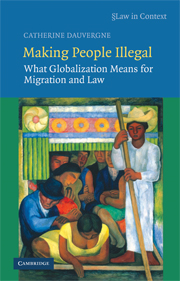Book contents
- Frontmatter
- Contents
- Acknowledgments
- Publication acknowledgments
- 1 Introduction
- 2 On being illegal
- 3 Migration in the globalization script
- 4 Making asylum illegal
- 5 Trafficking in hegemony
- 6 The less brave new world
- 7 Citizenship unhinged
- 8 Myths and Giants: The influence of the European Union and the United States
- 9 Sovereignty and the rule of law in global times
- Bibliography
- Index
- The Law in Context Series
- References
4 - Making asylum illegal
Published online by Cambridge University Press: 05 June 2012
- Frontmatter
- Contents
- Acknowledgments
- Publication acknowledgments
- 1 Introduction
- 2 On being illegal
- 3 Migration in the globalization script
- 4 Making asylum illegal
- 5 Trafficking in hegemony
- 6 The less brave new world
- 7 Citizenship unhinged
- 8 Myths and Giants: The influence of the European Union and the United States
- 9 Sovereignty and the rule of law in global times
- Bibliography
- Index
- The Law in Context Series
- References
Summary
This chapter addresses the decreasing availability of asylum in prosperous Western countries. The vital theme here is how international refugee law has become intertwined with the growing global concern about illegal migration. From an advocacy point of view, this is jarring. Refugees are not illegal migrants. Although the Refugee Convention does not specify a right to enter another country, it is widely understood to prohibit turning claimants away from a state party's borders, and it explicitly prevents states from punishing refugees for illegal entry. It seems, therefore, that conditions are in place to prevent refugees from being caught up in the illegal migration panic. This impression is heightened by the observation that international refugee law has been in place for more than half a century, that 147 states are signatories to the key Convention and Protocol, and that this high rate of adherence has prevailed for some time. In addition, the Refugee Convention, as I mentioned in Chapter 3, is the one exception to the principle that international law has very little to say about migration, and that states are by and large free to close – or open – their own borders.
All of these factors mean that it is crucial to understand why refugee law nonetheless fits with the argument I am making. Refugee law's relationship with state sovereignty is my reason for putting this core sample first.
- Type
- Chapter
- Information
- Making People IllegalWhat Globalization Means for Migration and Law, pp. 50 - 68Publisher: Cambridge University PressPrint publication year: 2008
References
- 1
- Cited by



